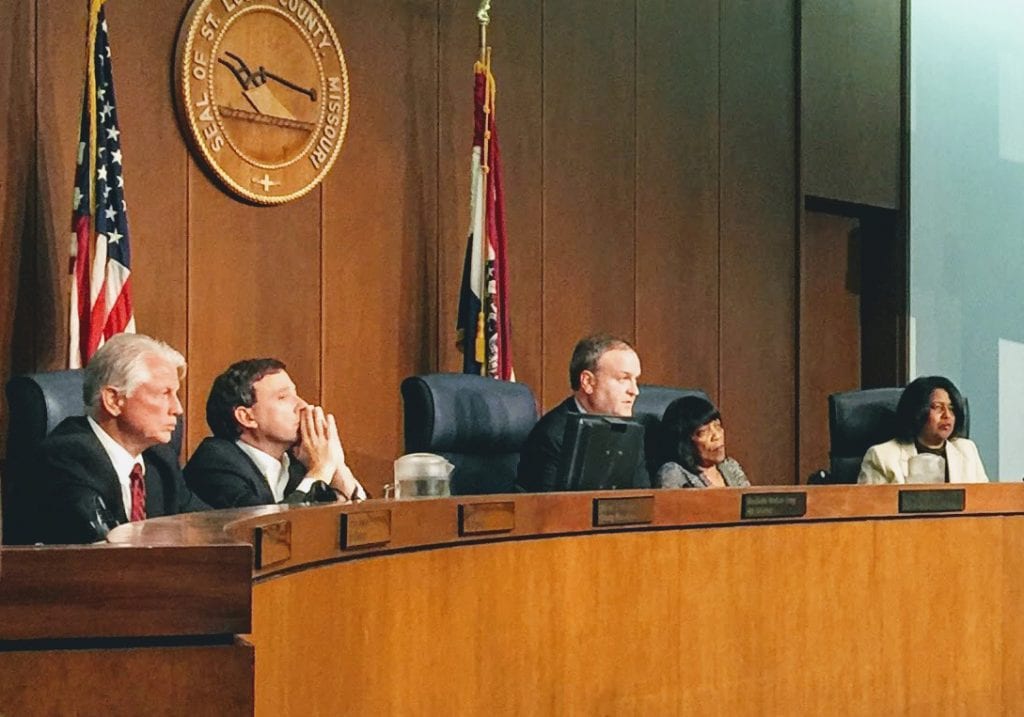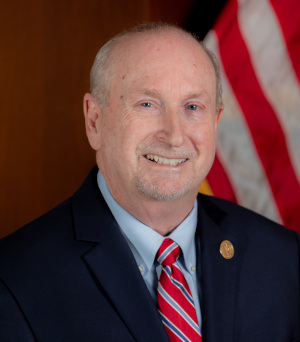County Executive Steve Stenger, second from left, listens to Rep. Bob Burns, D-Affton, address the council last year, left to right: 5th District Councilman Pat Dolan, D-Richmond Heights, Chairman Sam Page, D-Creve Coeur, 1st District Councilwoman Hazel Erby and 4th District Councilwoman Rochelle Walton Gray, D-Black Jack. Photo by Gloria Lloyd.
By Gloria Lloyd
News Editor
glorialloyd@callnewspapers.com
A judge sided with the County Council last week in its lawsuit against County Executive Steve Stenger, issuing a temporary injunction forcing Stenger to release the money he’s withheld from the council in a standoff over how county government operates.
Because council members say it nearly led to a shutdown of the County Council, the budget dispute is currently the most prominent among a range of issues in a lawsuit that members of the council brought against Stenger related to separation of powers in county government.

After the council in December cut an average of 13 percent from the 2018 budget of most departments except its own and the county Board of Elections, Stenger issued an executive order Jan. 3 that cut that same 13 percent, or $240,000, from the council budget and placed an extra $572,000 in reserve — the same amount that the council had increased its budget by to hire more auditors. Stenger’s sequestration maneuver was viewed by the council as payback for the cuts, but Stenger said that everyone in the county should be expected to tighten their belts equally. Legal arguments in a hearing and trial last month centered around whether the council is a legislative branch or a department under the Charter. If it is a branch, it has nearly equal power with Stenger, but if it is a department, Stenger has power over its money.
County Circuit Court Judge John Warner wrote in his ruling granting the council a preliminary injunction that Stenger was unlikely to prevail in court due to what the judge said was “wrongful conduct” in diverting money from the council. He also ruled that the county and taxpayers would suffer “irreparable harm” if he didn’t side with members of the council on the budget issue because the council could have shut down without the funds. Stenger issued two $50,000 extensions while he waited for the judge’s decision so that the council could make its payroll.
“It’s a total victory for the council, as it should be,” said 6th District Councilman Ernie Trakas, R-Oakville, who is one of the four council members who filed the lawsuit against Stenger more than a year ago. “It validates everything I’ve been saying from the outset: That there was no merit to the county executive’s action, that it was absolutely devoid of merit and that the council was a branch of government… a separate, viable, empowered branch of county government.”
The lawsuit is Trakas’ second victory in two weeks against what he views as actions taken by the county executive to target him. St. Charles County Judge Daniel Pelikan ruled last week in a rare quo warranto action that Trakas could keep his office and did not violate the Charter, as alleged by a special prosecutor and contended by Stenger. Trakas alleges that Stenger was behind the effort to oust him from office for conducting work for school districts that could be perceived as violating the Charter’s ban on council members holding other public employment.
Trakas said of his winning streak, “That’s usually what happens when you’re right.”
Responding for Stenger, his Chief of Staff Bill Miller said in a statement, “Today’s ruling is an interim opinion which is subject to change and will be finally determined in the future.”
Stenger addressed the possible legality of what he did the night that he issued the executive order: “It comes about as a result of a Charter authority that I have to move line items within budgets, and it can’t be reversed except by another executive order.”
He believed it was not only legal, but something he had to do for taxpayers to level the playing field on the council’s cuts.
“It just smacks of unfairness, and I think it’s something that needs to be righted,” Stenger said. “I was elected by the people of St. Louis County, not by the St. Louis County Council, and I’m not out for a popularity contest among them… I’m going to do what’s right for the taxpayers of St. Louis County. And if this saves them $527,000 per year for 10 years and that adds up to $5 million, I’m going to do that. I think that’s the right thing to do.”
That same night, council Chairman Sam Page, D-Creve Coeur, called the move “petty and illegal” and promised to fight back.
The argument continued in court all this year, with the council represented by outside attorney Elkin Kistner of Bick & Kistner and Stenger represented by outside attorney Christopher Bauman of Blitz, Bardgett & Deutsch.
Speaking this week before the decision was handed down, Page seemed to think that a ruling that favors the council could simmer things down between the two sides.
“Once that issue is settled and our funding is restored, I think that takes a lot of the pressure off the fractured relationships,” Page said. “I think the concept that the county executive could shut down the legislative branch if he doesn’t like how we’re voting or what questions we’re asking is a bit of a fantasy, and we need to get past it.”
A council shutdown would have stripped funding from the county clerk’s office, the council’s legislative assistants, the county auditor’s office and all those employees’ health insurance benefits, Page said.
Council members originally predicted they would have to shut down in mid- September, but Stenger granted them two $50,000 payments so they could continue operations while the lawsuit was being decided.
The council didn’t request that money, but it needed it to operate for the last several weeks, Page said.
If the ruling had gone the other way, the council chairman said “the County Council would have to decide if they could operate and make decisions and pass legislation. I think without staff to help us research these very complex issues that come before us, we’d have to be very careful about passing any legislation. This is a fundamental problem that we’ve had over the last two years is some of the information that we receive is very complex, and the information that we receive to support it frequently isn’t always complete. Sometimes it’s misleading.”



















